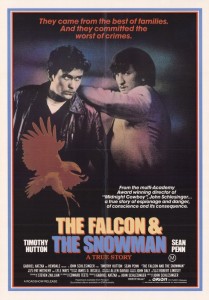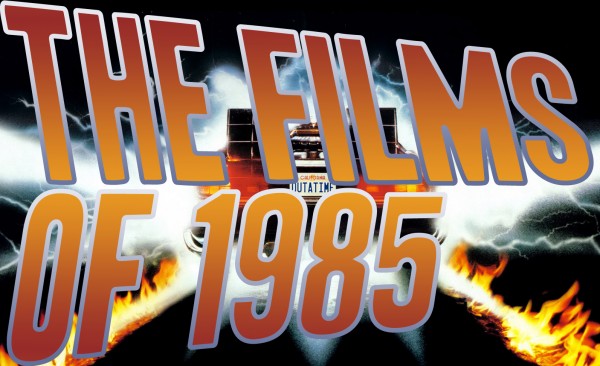1985 happened 30 years ago and so did I. Now, I’m looking back at the films from the year of my birth. All of them. Join me, won’t you?
 The Falcon and the Snowman (dir. John Schlesinger) 131 min
The Falcon and the Snowman (dir. John Schlesinger) 131 min
Release Date: January 25, 1985
Cast: Timothy Hutton, Sean Penn, Pat Hingle, Joyce Van Patten, Richard Dysart, Christopher Makepeace, Dorian Harewood, David Suchet
Writer(s): Robert Lindsey (book), Steve Zaillian (screenplay)
Synopsis: The true story of a military contract employee who enlists his drug-dealer friend in the selling of US secrets to the Soviet Union.
Review: While technically not the first big studio film in this series (That’s Dancing! is an MGM production, as well as an advertisement for its own classic films), this is probably the first “real” movie we’ve seen so far. It has an Oscar winning director in Schlesinger, a future Oscar winner in screenwriter Steve Zaillian (Schindler’s List) and another future Oscar winner in co-star Sean Penn. And it’s the kind of story that Hollywood still likes telling today. It’s got drugs, corruption, politics, family drama, etc. The interesting thing about it to someone with 2015-eyes is that it’s so firmly planted in a pre-Goodfellas storytelling style, before Scorsese’s non-diagetic jukebox scores and kinetic cinematography/editing exploded in the public consciousness. The tone here is a lot closer to All The President’s Men, or Schlesinger’s own Marathon Man. It’s a relic that still knows the value of restraint, extending to Penn’s acting, which feels like a precursor to bigger, broader performances we’d see in the 90s. It’s almost as if Penn had the presence of mind to recognize the technical proficiency and charm of his role as Jeff Spicoli and recalibrated it to something a little more serious. He has the looseness of a young actor willing to bet on his own charisma, with the talent to back it up. In some ways, it’s like seeing a completely different person on screen. The self-seriousness of his later roles calcified and hardened a boyish charm that we rarely see traces of these days (maybe Milk is the exception in the last decade).
Timothy Hutton is also very good, but he has the less interesting role as the seminary school dropout who resents his former FBI hero father (Hingle). His is a role that’s mostly anchored behind a desk, sometimes nervously stuffing papers into a file folder, rarely getting out into the field until much later. Both characters are naive and not as smart as they’d like to believe, but Penn’s arc sees him negotiating with Soviet spies (Suchet, British TV’s Poirot) while Hutton charms Lori Singer by twisting the heads off pigeons to feed his pet falcon. Despite being the catalyst for a lot of tense scenes, Hutton is just rarely at the center of them, which makes his character feel dull by comparison. He’s also saddled with some standard daddy issues, which are handled well enough (“You say more with a look than you know.”) and are meant to serve as at least one of the reasons why the real-life Christopher Boyce decided to betray his country, but feel stale all the same.
But again, this is Penn’s movie, with the best scenes hanging on how far his version of Dalton Lee is willing to push a situation, exerting leverage where he has none and mostly coming out on the other side unscathed. He does it with Soviet spies, but also with his beleaguered parents, who know about his drug habits (and business) but still have to listen to him wax bullshit about building them a house on a tropical beach with money he can’t justify having. In his bones he’s an addict and Penn layers that in everything Lee does. It’s not just the money or the thrill of pulling something over on the U.S. and Soviet governments, but the ability to brag about it at a party in an effort to get laid or wriggle out of a confrontation with his parents.
Schlesinger’s direction is mostly invisible throughout, allowing his actors and the story to do most of the talking. But there are nice moments when he makes his presence felt, like when Boyce’s pet falcon attacks a pigeon in mid-flight and we suddenly cut to a handful of white rose petals scattering on the ground in a Mexican funeral procession. A re-telling of this story today would almost certainly amp up the action and the tension, but lose something vital in the process. This was a time in history where things moved slowly, where spies took flights to foreign countries to exchange pieces of paper. It’s an era where photographs had to be developed and the story is told with a respect for the tension inherent in having to wait days, weeks or months before knowing how truly fucked you are.
Better Off Dead or The Sure Thing: The Sure Thing
Next Up: Fandango
